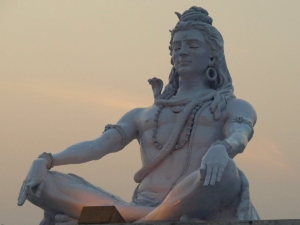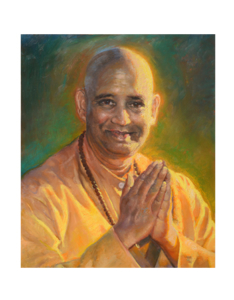Remembrance Of God
When you worry, your mind thinks of perishable objects – this is known as Chinta in Sanskrit. Contrary to Chinta is the Sanskrit term Chintan – Ishwara Chintan – which means remembering God, thinking of God.
In most people, the mind is constantly thinking of perishable things. It is dwelling on memories of the past, forming expectations for the future, or resolving present problems. You are constantly involved in the illusion of yesterday, today, and tomorrow.
But the greater task before the mind is to think of God, the Divine Self. Thinking of God is like becoming a swan and soaring beyond the lake into the blue sky. The mind is involved in the lake of the world process, but it has the potential to unfurl its wings and go beyond – to transcend the world of past, present and future, to transcend the world of time and space. That must be the goal before the mind.
A space-craft needs to build up sufficient momentum in order to escape the gravitational pull of the earth, and soar into outer space. In the same manner, your mind has to build up a special spiritual strength so that it is not caught up with the world. If it becomes caught up with the world, there is no end to the entrapment.
You may think that tomorrow will be more relaxed when certain problems are resolved, or in a few years later when you have more time, then you will just meditate on God. This is an illusion. The world essentially remains the same, although situations may change. In the same way that a child will worry about his toys, adults will often worry about many other things which are no different from toys from a higher perspective. The mind goes on thinking endlessly and in that process, mental energy is wasted.
On the spiritual path you begin to train your mind to think of God. Thinking of God is the ideal. In the beginning and aspirant does not understand the implications of what we mean by thinking of God. At first he may develop the idea that to think of God is to repeat his name – japa. But this is just the beginning, and at this stage the repetition of his name remains verbal. As the practice of japa deepens, the Divine sentiments that flow towards God will also deepen. One’s remembrance of God when repeating a Mantra should not only be verbal, but rather a combination of words and feelings that flow towards God.
In the Gita, Lord Krishna gives further insight into this fact. He says that there are four types of people who worship Me. “To worship Me” means to remember God, to think about God, to be devoted to God. The first is an Arta devotee – one who is in distress and feels that nothing in the world can sustain him except God. Another is an Artharthi devotee – one who desires wealth. The third type is known as Jignasu – one who inquires into knowledge, desirous of learning the secrets of nature and life. The fourth is called a Jnani – one who is enlightened.
These are literal meanings of Lord Krishna’s words, however there is a deeper meaning. You should love God or remember God in four ways. Firstly through your heart, through the language of love. Arta refers to that remembrance of God through the heart. It implies developing a feeling of love for God just as you have feelings of love for relatives, friends, or even for various objects of the world. The profound difference is that love for objects is perishable, while love for God is unending and eternal.
As you advance you begin to understand that all the objects and beings of the world are merely media through which the Divine Love flows. Thus, instead of your feelings being caught up by names and forms, they should be directed towards God. You begin to develop an internal spiritual yearning to be united with God.
It is the nature of the mind to yearn to acquire whatever objects you love. If God became the object of your love, your very soul will yearn for being united with Him. This yearning is Arta Bhakti. In this form of devotion, the yearning for the objects of the world are transmuted into the yearning for God.
Next is Artharthi, which means allowing your hands to work for the worship of God. If you love someone, you will serve that person with joy. As you begin to understand this, you bring Karma Yoga into your life. You convert your actions into worship of God. You feel that whatever duty is required of you, even those towards your relatives, is ultimately being done for God. Every work you do is meant for serving God. Therefore you pray to God for increasing capacity to serve Him in others. You become the seeker of “wealth” or “resources” for rendering your services to God – the reality behind every name and form.
The third type is Jignasu – the worshiping of God through your intellect – through the language of inquiry and reflection. Your intellect should become involved in reflecting upon the Divine Self and develop a profound interest in dissecting the illusions of things and diving deeper into the mysteries of existence. For that you are added by scriptural teachings.
Thus, in order to remember God most intensively and effectively there must be an advancement in an integral manner. That is to say, you should remember God through your heart, through your sublime feelings. You should remember God through your actions. And you should remember God through your reflections. When intellect, emotion, and action begin to integrate, then you are remembering God through your whole personality. That is a state of a Jnani. And this is the fourth type of devotee – the best of all.
“A Jnani” Lord Krishna says, “is the best because he worships God through his heart, through his head, and through his hands.” If your worship of God remains confined to a single aspect, that worship becomes limited. When you worship God through your entire personality however, you cannot turn away from God even for a minute. On the other hand, God also cannot turn away from you even for a moment. You are in God and God is in you, and that state is a state of saintliness. That is the ideal that one must aspire for and as you move towards that ideal, you will enjoy boundless peace, internal security, and you begin to view the world as the glory of God. You attain God-realization and become free of the cycles of birth and death!




